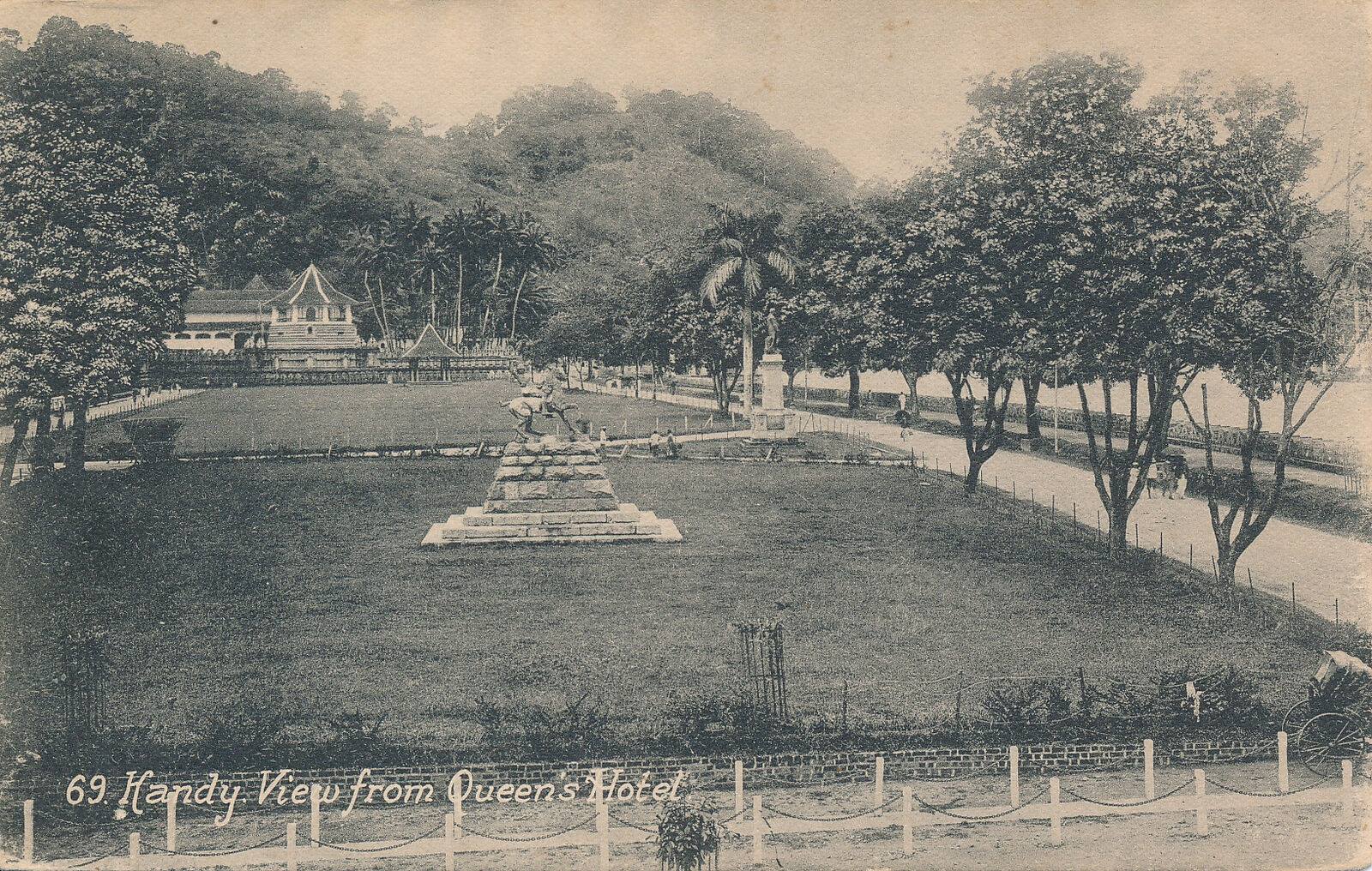Native Servants, Their Relation to British Masters
මෙහෙ ගෙදර වැඩටයි, වත්තෙ පිටියේ වැඩටයි පිරිමි මෙහෙකරුවන් තුන් හතර දෙනෙක් විතර ඉන්නවා. ආයලා දෙන්නෙක් ඉන්නවා පොඩි දරුවන් බලාගන්නයි, කාන්තාවන්ට වෙන්වුණු කොටසේ වැඩ වලටයි. මං හිතන විදිහට, බොහෝ ඉන්දියානුවන් සහ සිංහලයන් හරි කැමතියි මෙහෙකාර වැඩ කරන්න (හොඳ ස්වාමියෙක් ගාව).
 |
| Singhalese Ayah photographed by L.A. Beurteaux [Image Courtesy: www.imagesofceylon.com ] |
ස්වදේශික මෙහෙකරුවෝ , සහ බ්රිතාන්ය ස්වාමියන්
මේ සේවකයන්ගේ මාතෘ සංවේදී ජන්මගතිය බොහෝ විට ව්යවසායකත්ව ලක්ෂණ, අවදානමක් ගැනීමට ඇති කැමත්ත පෙන්නුම් කරනවා අඩුයි. ඊට වඩා ඔවුන් අන් අයගේ සෙවණක් මත යැපෙන්න බලාපොරොත්තු වෙනවා. හොඳ සැලකිල්ලක් ලැබුනොතින් අනිවාර්යයෙන්ම ඔවුන් සොඳුරු යහපත් සේවකයන් වනු ඇති. බොහෝ අවස්ථාවල ඔවුන්ගේ හිතෛෂීවන්තභාවය සහ සේව්ය-සේවක අවබෝධය, පැහැදිලිව ලියලා වැඩෙනු දැක ගන්න පුළුවන්. මට මතකයි වරක් ඉංග්රීසි වැසියෙක් ඔහුගේ සේවා ස්ථානයට සැතපුම් 200ක් ඈතකදි හදිසි අනතුරකට පත් වෙලා ඉන්නකොට, ඔහුගේ "භාරකාරයා", ප්රධාන සේවකයා මේ තොරතුර කණ වැකිච්ච හැටියේ, තොරතුරක් දැනගන්න පයින්ම ඒ ඔක්කොම දුර ඇවිදගෙන, තමන්ගේ ස්වාමියා මැරෙන්න කලින් එතැනට ආවා.
 |
| Judge Steele and his Servant photographed by Joseph Lawton [Image Courtesy: http://www.imagesofceylon.com ] |
හැබැයි ඉතින් එහෙම වුණාට මේ සේවකයන් තමන්ගේ ආචාරධර්මයන්ට පටහැනි ඕනෑම දෙයක් කරන්න සූදානම් කියලා හිතන් ඉන්නවනම් ඒකත් වැරදි වැටහීමක්. පෙරදිග ශබ්දාවලියේ "රාජකාරිය" කියන දේට, යුරෝපයේ කෙල්ටික මිනිස්සු දෙන තරම්වත් එච්චර වැදගත් තැනක් හිමි වෙන්නේ නෑ. මේක ජාතින් අතර තියන වැරදි වැටහීමකට බොහොම බලපාන හේතු සාධකයක්. බ්රිතාන්යයන් ඔවුන්ගේ ඉන්දියානු සේවකයන්ට ක්රමානුකූලව දිනපතා ගෙවීම් කරනවා. බ්රිතාන්යයන් ඉන් නැවත බලාපොරොත්තු වෙන්නේ නියමිත මුදලට අවශ්ය සේවයක් ලබා ගන්න එක. එහෙම ලැබුණේ නැතිනම් තමන්ගේ සේවකයන් පයින් ගහල එලවලා දාන්න අයිතියකුත් ඉන් ලැබෙනවා කියලා බ්රිතාන්යයන් හිතනවා.
 |
| Mr. Sternberg’s bullock conveyance, guides and servants in Ceylon photographed by F. Sternberg [Image Courtesy: www.lankapura.com ] |
බ්රිතාන්යයෝ හිතන්නේ මේක සාධාරණ ගණුදෙනුවක් කියලා. ඒත් මේ "බෙල්ලන්ට" මේක පොඩ්ඩක්වත් තේරෙන්නේ නෑ. ඔවුන් කැමතියි මේ කරන ගෙවීම අඩුවෙන් වුණත් අරගෙන මනුෂ්යයෙක්ට වගේ සහෝදරයෙක්ට වගේ තමන්ට සැලකුමක් ලැබෙනවා දකින්න.
 |
| Ernst Haeckel in Ceylon in the year 1881 [Image Courtesy: Manuscripts and Archives Division, The New York Public Library] |
හෙකල්ගේ වාර්තාවල ඔහුගේ රොඩී සේවක ගැටවරයා ඔහුට දක්වන දයාව සහ ආදරය ගැන සඳහන් වෙනවා. හෙකල්ට ඔහුව හැර දමා යන්න වුණු වෙලාවේ මේ කොලු ගැටයාට ඇතිවුණු අපේක්ෂා භංගත්වය හරිම සංවේදනීයයි. දහසක් මේ සමාන අහන්නට ලැබෙන කතාවලින් මේ තත්වය තහවුරු වෙනවා. අනික ඉතින් සේව්ය-සේවක බැඳීමක් නැතිනම් රාජකාරියක තියන තේරුම මොකද්ද?
"බෙල්ලන්ගේ" මේ තදබල ලෙස අන්යයන් මත යැපීමේ දුර්වල ගතිය කපටිකමක් කම්මැලිකමක් ලෙස දකින්නත් පුළුවන්. යුරෝපානු දාමරික ගමන් මඟකට වඩා ඔවුන්ගේ දුශ්චරිතය ගමන් කරන්නේ ඒ වගේ මාර්ගයක.
සේව්ය-සේවක සබැඳියාව හරි විදිහකට පවත්වගත්තේ නැතිනම්, ඔවුන්ට පුළුවන් ඔවුන්ටම ආවේණික විදිහකට තමන්ගේ ස්වාමියාව කාලකණ්ණි තැනකට පත් කරන්න. ඇත්තටම ඔවුන් එහෙම කරනවා. හැබැයි එතැන ඉඳන් පටන්ගන්නේ දෙන්න දෙපැත්තට බැණ ගන්න ඉවරයක් නැති ආරවුලක් තමයි.
 |
| Singhalese Headman (Village Judge) photographed by Plate & Co. [Image Courtesy: www.imagesofceylon.com ] |
 |
| Singhalese Appu photographed by Scowen & Co. [Image Courtesy: www.imagesofceylon.com ] |
චණ්ඩාලයන් සහ අපේ මුඩුක්කු වාසීන්
මායි මෙහෙ ඉන්න අස්සපාලකයයි, අපි දෙන්නගෙ ශබ්දමාලාව අඩු නිසා සංවාද ඉතා සීමාසහිත වුණත් හොඳ යාළුවෝ බවට පත් වුණා. යමෙකු දකින විට මුහුණේ මතුවන හිතෛෂීවන්ත භාවයේ හිරිහැරයත් විරිත්තිල්ලත් ඇති ඔහු සාමාන්ය කල්ලෙක්.
 |
| Group of Tamil Servants photographed by Skeen & Co. [Image Courtesy: www.imagesofceylon.com ] |
 |
| Le Puddleur (The Puddler) by Constantin Meunier, 1887 © Royal Museum of Fine Arts Brussels, Belgium. |
ඒකත් හරිම පුදුමාකාර දෙයක්. නිරන්තරයෙන්ම මගේ හිතට වැදුණු කාරණයක් තමයි, මෙහි සිටින පහත් කුලවල සිටින අයයි, අපේ මහා නගර වල සිටින මුඩුක්කු වාසීනුයි අතර තියන සමපාත බව. දෙගොල්ලන්ගෙම දේහ ලක්ෂණ ගත්තත්, හැමවිටම උදාර බවක් පෙන්වන අචේතනික පුද්ගල ගතිලක්ෂණ ගත්තත්, ඒවායේ සමරූපිතාවක් දකින්න පුළුවන්. "මියුනියර්ගේ" යකඩ වැඩකරුගේ ප්රතිමාවේ ("පඩ්ලෙයර්") මෙන් හොඳින් හඳුනාගත හැකි මෘග ගතිය, හැඩයක් නැති කට, යම් ප්රමාණයක ඝන ඇහිබැමි දකින්න තියනවා වගේම ඊට වැඩිමනක් ලෙස ඝන තොල්පෙති පිහිටා තියනවා.
“ආදම්ගේ ශිඛරය මතින් එලිෆන්ටා ගුහා වෙත – ලක්දිව සහ ඉන්දියාවේ රූප සටහන්” : එඩ්වඩ් කාපෙන්ටර්
තෙවන පරිච්ඡේදය : කුරුණෑගල
We have three or four male servants about the house and garden, and there are two ayahs, who look after the children and the women's apartments. I believe many of these Indian and Cinghalese races love to be servants (under a tolerably good master) ; their feminine sensitive natures, often lacking in enterprise, rather seek the shelter of dependence. And certainly they make, in many instances and when well treated, wonderfully good servants, their tact and affectionateness riveting the bond. I know of a case in which an English civilian met with an accident when 200 miles away from his station, and his " bearer," when he heard the news, in default of other means of communication, walked the whole distance, and arrived in time to see him before he died. At the same time it is a mistake to suppose they will do anything out of a sense of duty. The word duty doesn't occupy an important place in the Oriental vocabulary, no more than it does among the Celtic peoples of Europe. This is a fruitful source of misunderstanding between the races. The Britisher pays his Indian servant regularly, and in return expects him to do his duty, and to submit to kicks when he doesn't. He, the Britisher, regards this as a fair contract. But the oyster doesn't understand it in the least. He would rather receive his pay less regularly, and be treated as " a man and a brother." Haeckel's account of the affection of his Rodiya servant-lad for him, and of the boy's despair when Haeckel had to leave him, is quite touching ; but it is corroborated by a thousand similar stories. But if there is no attachment, what is the meaning of duty ? The oyster, in keeping with his weaker, more dependent nature, is cunning and lazy—his vices lie in that direction rather than in the Western direction of brutal energy. If his attachment is not called out, he can make his master miserable in his own way. And he does so; hence endless strife and recrimination.





Comments
Post a Comment